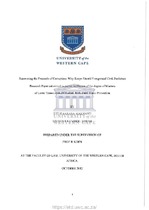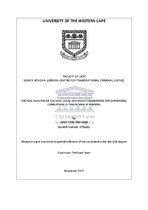Recovering the Proceeds of Corruption: Why Kenya Should Foreground Civil Forfeiture
Abstract
Today corruption is a major concern for most countries.1 Civil forfeiture of the proceeds of corruption has been embraced as a key strategy by many states in recovering public funds lost through corruption.2 It may be defined as a remedial statutory device designed to recover the
proceeds of a crime as well as its instrumentalities.3 Originally, asset recovery regimes adopted by most states were predominantly criminal
forfeiture. This mode of forfeiture is preceded by a conviction, after which the state takes possession of the proceeds of the crime from a convicted individual.4 Its proceedings are in personam and the standard of proof is proof beyond a reasonable doubt. Thus, actual forfeiture
only takes place after the issue of a conviction order. As a consequence, it is always lengthy and often results in delayed realisation of the proceeds of crime. 5 The inherent weaknesses of criminal forfeiture gave birth to the idea of developing a civil forfeiture system.6 This mode is different from the former in that its proceedings are in rem. Hence the standard of proof is proof on a balance of probabilities and a conviction order is not required.7
Related items
Showing items related by title, author, creator and subject.
-
Anti-corruption agencies in Africa: a comparative analysis of Rwanda, Sierra Leone and Malawi
Gashumba, Jeanne Pauline (University of the Western Cape, 2010)Corruption is a serious problem which has many negative impacts on sustainable economic development globally. The clandestine nature of corruption makes it difficult to detect. Hence, efforts to combat corruption successfully ... -
Exploring a sustainable anti-corruption regime for Tanzania
Lukiko, Lukiko, Vedastus (University of the Western Cape, 2017)Corruption is among the world's devastating social, economic and political problems. It is enormous to the extent that ''not one single country, anywhere in the world, is corruptionfree''. Its effects on the quality of ... -
Critical analysis of the SADC legal and policy framework for combating corruption in trafficking in persons
Chimwaga, Juliet Cindy (University of the Western Cape, 2017)The fight against human trafficking requires a broad range of approaches, including the eradication of crimes that facilitate trafficking of human beings. The idea of committing crimes within crimes is common in most ...




